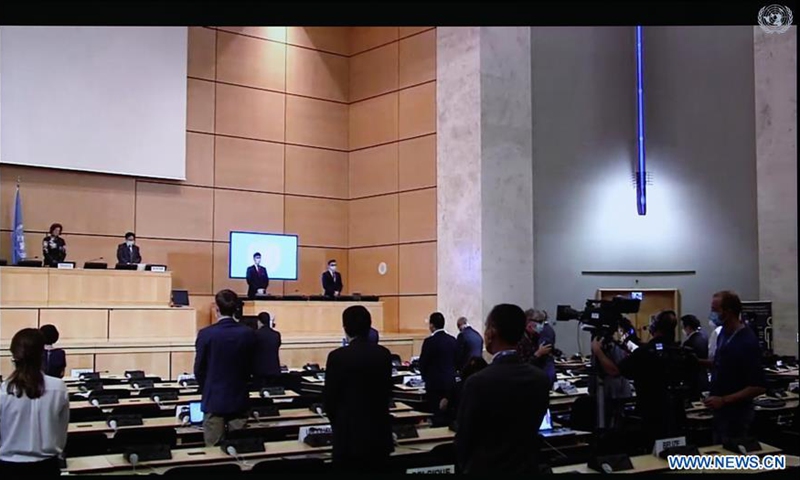‘Black lives do not matter’: Floyd’s brother
Source:AFP Published: 2020/6/18 15:23:40
UN officials listen as family protests centuries of American violence

Photo taken on June 17, 2020 in Brussels, Belgium shows a screen that displays the 43rd Regular Session of the UN Human Rights Council held in Geneva, Switzerland. The UN Human Rights Council on Wednesday afternoon began its urgent debate on racism and police brutality in the follow-up to the killing of George Floyd in the United States, following a request made by Burkina Faso on behalf of the African Group. (Xinhua/Zheng Huansong)
George Floyd's brother on Wednesday begged the United Nations (UN) to help African-Americans because "black lives do not matter in the United States," as the UN's rights chief urged reparations for centuries of discrimination.Philonise Floyd made an impassioned speech via video-link to an urgent UN Human Rights Council debate on "systemic racism" in the US and beyond.
Michelle Bachelet, the UN High Commissioner for Human Rights, said the "gratuitous brutality" of Floyd's death in police custody encapsulated racism that harmed millions of people of African descent.
She also urged countries to confront the legacy of slavery and colonialism and to make reparations.
The council, based in Geneva, is debating a draft resolution pushing for Bachelet to investigate racism and police civil liberties violations against people of African descent in the US.
US President Donald Trump withdrew the US from the council in 2018.
Floyd, a 46-year-old black man, died in Minneapolis on May 25 after a white police officer - since charged with murder - pressed his knee on Floyd's neck for nearly nine minutes.
Amateur video of the incident sparked demonstrations and calls to address systemic racism in the US and around the world.
Philonise Floyd said his brother had been "tortured to death" as witnesses begged the officer to stop, "showing us black people the same lesson, yet again: Black lives do not matter in the United States of America."
"You in the United Nations are your brothers' and sisters' keepers in America, and you have the power to help us get justice for my brother George Floyd."
"I am asking you to help him. I am asking you to help me. I am asking you to help us black people in America."
He urged them to establish an independent international commission of inquiry - one of the UN's highest-level probes, generally reserved for major crises like the Syrian conflict.
An initial text presented on Tuesday on behalf of 54 African countries had proposed such an inquiry.
But the proposal was dropped, the resolution heavily watered down following stark opposition from Washington and some of its allies.
It now calls on Bachelet and UN rights experts to "establish the facts and circumstances relating to the systemic racism, alleged violations of international human rights law and abuses against Africans and people of African descent" by law enforcement in the US and beyond - especially those incidents that resulted in deaths.
The aim, it said, was "to ensure the accountability of perpetrators and redress for victims."
In her statement to the council, Bachelet said Floyd's death had brought to head the sense of outrage felt by overlooked people and the protests were "the culmination of many generations of pain."
AFP
Posted in: AMERICAS,WORLD FOCUS,EYE ON WORLD